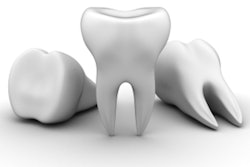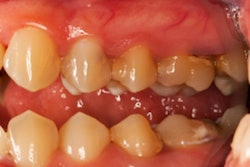
Does periodontal disease in pregnant women lead to miscarriages? If mothers-to-be are exposed to fluoride, will their children have low IQs? Such findings are often the result of "tooth fairy science," and dental professionals should be skeptical when reading this type of research, according to a talk at the recent ADA 2017 annual meeting in Atlanta.
 Angelo Mariotti, DDS, PhD, spoke about periodontal-systemic associations.
Angelo Mariotti, DDS, PhD, spoke about periodontal-systemic associations.In a sometimes humorous lecture, Angelo Mariotti, DDS, PhD, a professor and the chair of periodontology at Ohio State University, spoke about the authenticity of perio-systemic relationships reported in the medical literature. These associations include cardiac and vascular diseases, pulmonary diseases, adverse pregnancy outcomes, and other conditions, including rheumatoid arthritis, multiple sclerosis, diabetes, and Alzheimer's disease.
"Most periodontal-systemic associations are the result of 'tooth fairy science,' " he said.
"Tooth fairy science" refers to conducting research on a phenomenon before establishing that the phenomenon exists, such as performing studies on the amount of money left per tooth by the tooth fairy without having first verified that the tooth fairy actually exists.
Separating wheat from chaff
Dr. Mariotti discussed the relationship between periodontal disease and adverse pregnancy outcomes, such as babies born prematurely and those with a low birth weight.
“Most periodontal-systemic associations are the result of ‘tooth fairy science.’ ”
He questioned the biological plausibility of such an effect, in part because periodontal disease was endemic in our ancestors, and if the effect would have survived natural selection. He also questioned whether there was a mechanism for the effect of periodontal disease on pregnancy outcomes, such as microbes from biofilm being shaken loose, passing through the placenta and affecting the developing fetus.
Dr. Mariotti showed the results of a meta-analysis of studies on the topic indicating that periodontal disease did not affect pregnancy outcomes. Specifically, the combined results of five high-quality clinical trials with low bias found that periodontal treatment produced no changes in preterm birth and failed to reduce the rate of low-birth-weight infants, spontaneous abortions or stillbirths, or overall adverse pregnancy outcomes. Currently, there is no conclusive evidence that treating periodontal disease will improve birth outcomes, he said.
"My argument is that if this is such a robust effect in the population, we'd see it if you intervened," Dr. Mariotti said.
So which reported perio-systemic connections might be real phenomenon?
"Currently, the strongest evidence to support a relationship is between diabetes mellitus and periodontal disease," Dr. Mariotti told DrBicuspid.com.
Taking the red pill
A long list of diseases are associated with periodontal disease, but Dr. Mariotti explained that many of these relationships have been found only in observational studies, and no one research paper can ever be considered the final word.
In general, the vast majority of observational studies can't reproduce their data, he said. He also shared images and videos illustrating various scientific "facts" that we used to believe to be true, such as the association between problematic cholesterol levels and eggs and also between ice cream consumption and polio.
"It's important that we question the types of things we see in the literature," he said.
Although observational studies are limited in scope, they can be useful, Dr. Mariotti said. For example, they helped with identifying that cigarette smoking was a problem, he pointed out. However, those studies were numerous, consistent, and backed up by randomized controlled trials, he added.
A large volume of research is currently being produced, with more information generated in the past year than in the previous 5,000 years, Dr. Mariotti noted. However, only 6% or 3,000 of the 50,000 new journal articles reviewed annually are of high enough quality to influence patient care, according to research he cited.
Additionally, 14 of 49 of highly cited original studies were later contradicted or found to have smaller effects than originally suggested, according to a 2005 study published in the Journal of the American Medical Association (July 2005, Vol. 294:2, pp. 218-228) that he mentioned.
Dr. Mariotti also pointed out that the recently published study reporting a relationship between higher fluoride levels in the urine of pregnant women and later lower IQ scores in the children with whom they were pregnant was an observational study.
He urged dentists to look at whether a study illustrated a correlation, as in an observational study, or if there was a causal factor at work.
"I hope from this talk that I've made you a bit of a contrarian," Dr. Mariotti concluded.



















